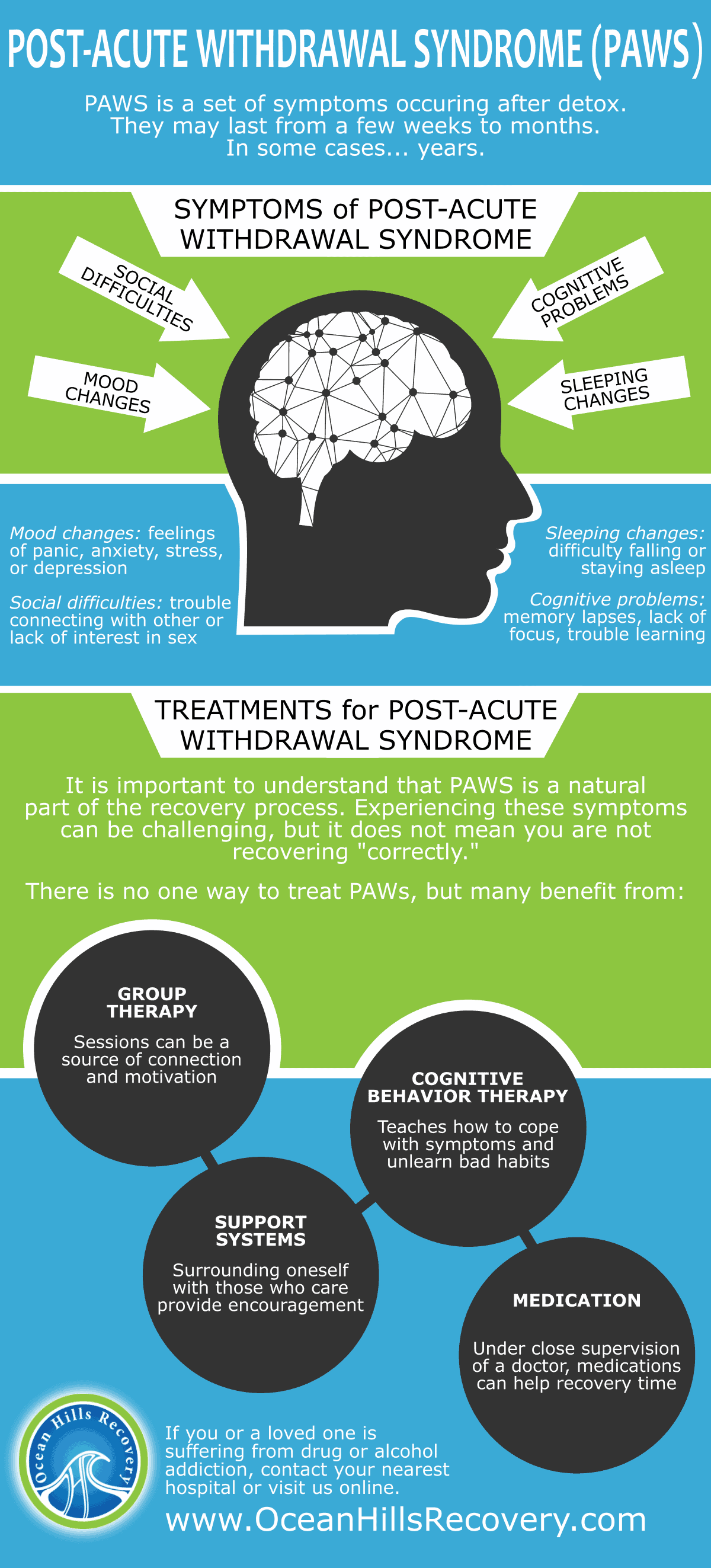Recovering from an addiction is a process. Rarely does someone who enters recovery move immediately from Point A to Point B. Addiction recovery is an exercise in strength. Someone going through recovery will experience challenges and struggles that they are unprepared for. It is important to consider some of these unexpected hurdles, and how to overcome them.
One aspect of recovery that many people face is the onset of Post-Acute Withdrawal Syndrome (PAWS). What is PAWS and how can you navigate the challenges that come with it?
What is Post-Acute Withdrawal Syndrome (PAWS)?
PAWS is a set of symptoms that occur for a period of time post-detox. These symptoms are the result of the toll the drug is taking on the body. They may last anywhere from weeks to months. In some cases, they may last years.
While studies involving PAWS are still ongoing, it is believed that PAWS is caused by changes in neurotransmitters due to drug use. Ultimately limiting the brain’s capabilities to deal with stress or stimuli and resulting in the excitability of the neurotransmitters.
What are the Symptoms of Post-Acute Withdrawal Syndrome?
While not everyone who experiences PAWS will present symptoms with the same level of severity or on the same timeline, the most common symptoms are: 1
-
- Cognitive problems: Difficulties in learning, lapses in memory, limited focus, and struggling with problem-solving.
- Mood changes: Feelings of panic and anxiety, and increased sensitivity to stress, depressed mood, irritability, apathy, and pessimism.
- Social difficulties: Struggling to form and create social relationships and a lack of interest in sex.
- Sleeping changes: Difficulty getting to sleep, staying asleep, sleeping too much, or an overall observed change in sleep patterns.
This is not an inclusive list of symptoms. Someone with PAWS may experience one, all, or a combination of these symptoms.
Continued after infographic:

How is Post Acute Withdrawal Syndrome Treated?
First and foremost, it is important to understand that Post-Acute Withdrawal Syndrome is a natural part of the recovery process. Experiencing these symptoms can be challenging, but it does not mean that you are not recovering ‘correctly.’ It does not mean that you are ‘broken.’ PAWS symptoms do not last forever.
There is not a singular method in treating PAWS. Those experiencing PAWS are known to benefit from:
- Group therapy. Attending group therapy sessions provides those struggling with an addiction a support system for those who can relate to their struggles. Group therapy sessions while experiencing PAWS symptoms, as well as during recovery in general, can be a source of connection and motivation.
- Cognitive Behavior Therapy (CBT). Regular cognitive behavioral therapy sessions can help you cope with the changes you are experiencing with your body and mind post-detox. CBT can help you to unlearn negative behaviors, improve emotional regulation, and develop healthy coping mechanisms. 2
- A strong support system. It is essential that you cultivate a strong support system that will encourage you and support you during your journey. Surround yourself with people that love you and want the best for you.
- Medication. Some medications can help control the symptoms of PAWS, under the close supervision of a physician. If you need extra support coping with PAWS symptoms, speak with your care team.
Will Everyone in Recovery Experience PAWS?
It is common for symptoms of Post-Acute Withdrawal Syndrome to present themselves in individuals withdrawing from benzodiazepines, alcohol, some psychoactive substances, and opioids. Estimates show 90% of opioid users experience PAWS symptoms. 3 Studies have shown that even those using ‘milder’ drugs such as marijuana can experience PAWS.
Although it is common, not everyone in recovery will experience symptoms of PAWS. Symptoms in individuals that do experience PAWS will vary depending on a variety of factors from overall health, gender, body size, and type of dependency.
Addiction Recovery with Ocean Hills Recovery
At Ocean Hills Recovery, we understand the importance of holistic addiction recovery. Our compassionate team uses proven methods to help those in our care. We also use evidence-based psychotherapy to create individualized addiction recovery plans for our clients.
No matter where you are in your recovery, our team of professionals are here to support you along the way. If you are experiencing PAWS symptoms and need assistance coping with the challenges associated with addiction recovery, contact a member of our team today.
Sources:
[1] https://www.apa.org/ptsd-guideline/patients-and-families/cognitive-behavioral
[2] https://www.semel.ucla.edu/dual-diagnosis-program/News_and_Resources/PAWS













